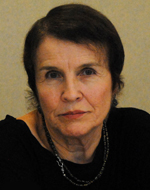We will carry it on
After coming this far, we won’t stop now.
|
|
|
Roberta Lynch |
As union members all across America face a new reality—a Supreme Court ruling in the Janus case that greatly strengthens the hand of the already rich and powerful—I find myself thinking back on the history of the labor movement in our country—of challenges overcome and of those who came before.
In particular, I’ve been thinking about four stalwart defenders of workers’ rights who we lost in the first half of this year—Paul Booth, Barbara Hillman, Ed Sadlowski and Gloria Arsenau.
Every one of us, no matter what we do in life, stands on the shoulders of someone who preceded us: Someone who first cleared the ground we farm today, who wrote the score for the music we play, who fought on foreign shores for the freedoms we cherish.
For working people in this country and across the globe, there are countless such someones—men and women who came together, despite fierce opposition, to assert their right to a decent standard of living and a voice in the decisions that affect their lives. By uniting to form unions, they sought to overcome the harsh, demeaning and unsafe conditions in which they labored.
Employers were against them. The law was against them. The press was against them. And too often the politicians were against them. Many lost their jobs, their income, their prospects; some lost their lives. But they would not be deterred.
It took nearly a century of struggle to enact the first federal laws that solidified fundamental workplace rights—and many decades more before those rights were extended to public employees through state laws.
I’ve been around long enough to recall when public employees in Illinois didn’t have the legal right to form a union and were completely at the mercy of their employers. Over many years, state, city and county workers took direct action at their workplaces, made demands to bargain, and put pressure on decision-makers, all to secure the basic right to be recognized as a union and bargain collectively.
It wasn’t until 1984 that Illinois public employees gained that right. In the years that followed, hundreds of thousands of them voted overwhelmingly to form unions at their workplaces.
That explosion of organizing transformed countless lives. Pensions that had been a pittance became the promise of dignity in retirement. Salaries that barely supported a family came to reward dedication and years of service. Promotional opportunities were now based on fairness, not favoritism.
None of this progress happened by chance. It happened because of people like Paul, Barbara, Ed and Gloria.
Before he moved to Washington, DC to work for the national union Paul Booth was a key strategist in laying the groundwork for the powerful force that AFSCME became in Illinois. Paul had the air of an absent-minded professor—piles of papers under his arm, tie askew, glasses low on his nose—but his mind was razor-sharp. He was a tireless organizer, laser-focused on improving the lives of working people.
Barbara Hillman was a pioneering woman labor lawyer. It’s fitting that she often represented the Steelworkers union, since she had a steely resolve that could cow even the most arrogant management-side attorney. Barbara aided early efforts to forge Illinois collective bargaining laws, regulations, and judicial rulings that expanded the ability of public employees to have a say in the decisions that affect our working lives.
Ed Sadlowski, former leader of the Steelworkers in the Calumet region, was a powerful voice for economic justice who never backed down from any fight and stood up for workers everywhere. His fierce commitment to dignity for every worker influenced countless trade unionists all across the country.
Gloria Arsenau, longtime president of AFSCME Local 2794 in the Kankakee area, passed away just last month. A passionate union advocate for more than three decades, she served on the Council 31 Executive Board and on every state bargaining committee since 1988.
Gloria studiously worked to avoid the spotlight, but she was the person who came to every meeting, prepared the agenda, took the minutes, walked countless picket lines and never failed to respond to a member’s call for help. During a five-year battle with ovarian cancer, Gloria’s strength, commitment and character emerged even more clearly. She never complained and she never quit.
Each of these lives has meaning for every one of us. Like countless others before them, these four dedicated trade unionists fought for the rights we have today.
The question for every union member now is this: Will we heedlessly surrender those rights to the likes of Bruce Rauner and his fellow billionaires who have battled to ban fair share fees in the hopes of driving down membership and bankrupting unions?
I refuse to believe that we will. After coming this far, we won’t stop now. We’re going to stay united and stay strong so that our shoulders will someday be the ones that our children and grandchildren stand upon to forge their own better lives.




